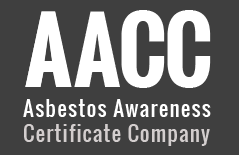
Who Needs Asbestos Awareness Training?
According to the Health and Safety Executive (HSE), every employer must ensure that any worker who is likely to encounter asbestos while on the job, or any individual responsible for supervising such workers, receives appropriate asbestos awareness training. This is essential to ensure they can work safely and without risking exposure to harmful asbestos fibres. The regulations apply to a broad range of industries where workers may unknowingly disturb asbestos-containing materials (ACMs).
The ability to recognise ACMs and knowing what steps to take when asbestos is discovered are crucial skills that all workers in relevant industries should possess. Asbestos awareness training plays a significant role in building these competencies and is a critical part of any comprehensive health and safety strategy in the workplace.
The Asbestos Awareness Courses provided by the Asbestos Awareness Certificate Company, which are approved by the Independent Asbestos Training Providers (IATP) and the Royal Society for the Prevention of Accidents (RoSPA), are specifically designed to target workers who may disturb asbestos or encounter materials that could potentially contain it during their work. By completing this training, workers can safeguard their own health as well as the health of others who may be at risk from disturbed asbestos fibres.
Who Should Receive Asbestos Awareness Training?
Asbestos awareness training is required for anyone who could disturb ACMs during their work. This includes both full-time employees and contractors who may be involved in various construction, renovation, or maintenance activities. Supervisors overseeing such projects also need to be adequately trained to ensure that they can identify potential asbestos risks and take appropriate action.
A broad range of job roles require asbestos awareness training, including the following:
- General maintenance workers
- Electricians
- Plumbers
- Joiners
- Plasterers
- Painters and decorators
- Construction workers
- Roofers
- Shop fitters
- Gas fitters
- Heating and ventilation engineers
- Demolition workers
- Telecommunication engineers
- Fire and burglar alarm installers
- Computer and data installers
- Architects
- Building surveyors
These roles frequently involve working in or around buildings that may contain asbestos, particularly those constructed before the year 2000. However, there are other occupations beyond the ones listed where asbestos might be disturbed, so it’s essential that both employers and employees assess the risks in their specific roles and work environments.
Why is Asbestos Awareness Training Important?
Asbestos remains one of the most dangerous substances to encounter in the workplace. When asbestos fibres are inhaled, they can cause severe and often fatal diseases, including mesothelioma, lung cancer, and asbestosis. These diseases typically take years, if not decades, to develop, meaning many individuals who were exposed to asbestos during their careers may not show symptoms until long after the exposure occurred.
Even though asbestos was banned in the UK in 1999, it is still present in many older buildings. Asbestos awareness training educates workers and supervisors on how to identify asbestos, what to do if they encounter it, and the importance of following safety protocols. This knowledge is crucial to preventing accidental exposure that could put lives at risk.
Do Self-Employed Workers Need Asbestos Awareness Training?
Yes, self-employed workers must also ensure they have the right level of asbestos awareness training. Although self-employed individuals may not have a direct employer, they are still responsible for ensuring their work activities do not put themselves or others at risk of asbestos exposure. Asbestos awareness training can provide self-employed workers with the necessary information to make informed decisions, avoid dangerous situations, and comply with health and safety regulations.
By obtaining asbestos awareness certification, self-employed workers can also demonstrate their competence to clients or contractors, showing that they take health and safety seriously. This can be particularly valuable when bidding for work, as many contracts require proof of asbestos awareness training before work can begin.
Is an Asbestos Awareness Certificate Legally Required?
There is no legal requirement for employees to hold a formal certificate of training before they can work with asbestos. However, the asbestos awareness certification provided by the Asbestos Awareness Certificate Company can be an important part of an individual’s training record. Having a certification can help demonstrate a worker’s knowledge and experience, especially if they move between employers or work in roles that require proof of health and safety training.
The Control of Asbestos Regulations 2012 requires employers to ensure that anyone likely to disturb asbestos has received appropriate training, and maintaining records of this training can help employers demonstrate compliance during inspections or audits. While the certificate itself is not mandated by law, it serves as valuable evidence of a worker’s commitment to safety and asbestos awareness.
Conclusion
Asbestos awareness training is crucial for a wide variety of tradespeople, contractors, and supervisors who may encounter asbestos in their daily work. The training helps them to recognise asbestos-containing materials, understand the risks, and take appropriate steps to avoid exposure. It’s not just about compliance with health and safety regulations; it’s about protecting lives from the long-term dangers of asbestos exposure.
Whether you are an employer looking to protect your workforce or a self-employed contractor wanting to ensure your own safety, asbestos awareness training is an essential part of your overall health and safety education. To find out more about our asbestos awareness courses and to book your training, visit the Asbestos Awareness Certificate website today.



